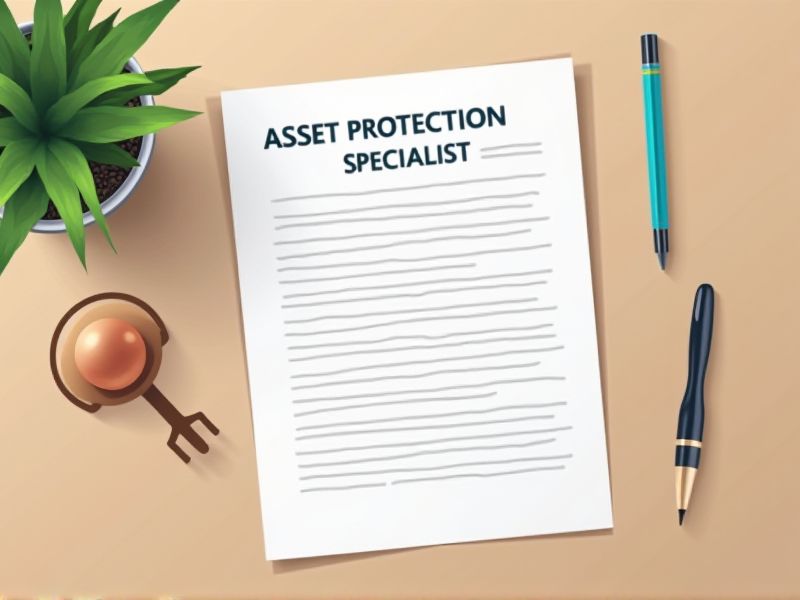
Asset Protection Specialists are responsible for mitigating risks and ensuring the safety of company assets, which requires a comprehensive understanding of security protocols and risk management strategies. Certain certifications provide specialized knowledge in areas like loss prevention, asset management, and safety compliance, enhancing the effectiveness of these professionals. Certifications such as Certified Protection Professional (CPP) or Loss Prevention Qualified (LPQ) validate a specialist's expertise and commitment to their role. Here are some crucial certifications you may need as an Asset Protection Specialist.
Certified Protection Professional (CPP)
The Certified Protection Professional (CPP) credential enhances an Asset Protection Specialist's ability to effectively manage security risks through comprehensive expertise. Acquiring the CPP designation demonstrates a recognized standard of professionalism and knowledge critical for protecting assets in various industries. Having a CPP improves strategic planning and implementation of security measures due to an in-depth understanding of security management principles. The CPP certification increases the trust and credibility among stakeholders by verifying an individual's commitment to maintaining high standards in asset protection.
Physical Security Professional (PSP)
A Physical Security Professional (PSP) is crucial for developing comprehensive security strategies to safeguard tangible and intangible assets. Their expertise in risk assessment allows them to identify vulnerabilities, which is essential for preventing unauthorized access or theft. PSPs implement effective security measures, including surveillance systems and physical barriers, to deter potential threats. With thorough knowledge of security technologies and protocols, they ensure that the assets of an organization remain protected against diverse risks.
Professional Certified Investigator (PCI)
A Professional Certified Investigator (PCI) contributes advanced skills in gathering and analyzing evidence, crucial for addressing complex security breaches affecting asset protection. Their certification ensures in-depth knowledge of legal statutes and ethical standards, which is vital for maintaining compliance and reducing liability risks in asset protection. A PCI brings strategic thinking and problem-solving capabilities, enhancing an organization's ability to prevent, detect, and handle losses effectively. This specialized expertise supports the development of more robust security protocols, which are essential for safeguarding company assets in an increasingly complex threat landscape.
Certified Fraud Examiner (CFE)
Certified Fraud Examiners bring expertise in identifying fraudulent activities, which strengthens an asset protection team's ability to safeguard resources. Their skills in forensic accounting help detect financial inconsistencies, pivotal for maintaining robust internal controls. As CFEs understand regulatory compliance, they ensure that asset protection strategies align with legal standards. CFE training in fraud prevention equips organizations with proactive measures to minimize the risk of asset loss.
Certified in Risk and Information Systems Control (CRISC)
Being certified in Risk and Information Systems Control (CRISC) enhances an Asset Protection Specialist's ability to identify and assess IT risks effectively. This certification provides the necessary skills to implement robust information systems controls, which are crucial for safeguarding company assets. Understanding risk management through CRISC helps in establishing a proactive approach to prevent data breaches and financial losses. Employers often seek individuals with CRISC certification for its proven indication of expertise in managing enterprise risks and securing organizational assets.
OSHA 30-Hour General Industry Certification
The OSHA 30-Hour General Industry Certification equips an Asset Protection Specialist with comprehensive safety knowledge applicable to a range of workplace environments, enhancing their ability to identify potential hazards. Ensuring compliance with OSHA standards reduces the risk of workplace accidents, which in turn can lower insurance costs and improve worker morale. Asset Protection Specialists with this certification can better enforce safety protocols, leading to a more secure and efficient operation. Employers often require this certification to validate expertise in safety, minimizing liability concerns and safeguarding business assets.
Certified Security Project Manager (CSPM)
A Certified Security Project Manager (CSPM) ensures effective planning and execution of security projects, which is crucial for protecting valuable assets. Their expertise in coordinating resources and aligning security strategies helps mitigate potential risks and vulnerabilities. CSPMs bring a structured approach to identifying threats and implementing solutions, reducing loss and unauthorized access to assets. By integrating knowledge of technological advancements and organizational needs, CSPMs enhance the overall security posture of asset protection specialists.
Loss Prevention Certified Professional (LPCP)
The LPCP certification ensures that an Asset Protection Specialist has a rigorous understanding of risk management and theft prevention strategies. This specialized knowledge allows them to effectively implement measures that reduce losses within an organization. Organizations often seek certified professionals because they bring credibility and improved operational efficiencies. With the rise in retail thefts, certified specialists are crucial in maintaining profit margins and ensuring the safety of company assets.
Certified Emergency Manager (CEM)
The expertise of a Certified Emergency Manager (CEM) enhances risk assessment capabilities, allowing Asset Protection Specialists to identify vulnerabilities effectively. Knowledge gained from CEM training enables the development of comprehensive emergency plans, enhancing response strategies for asset protection. A CEM's skills in coordinating with various agencies improve collaboration, crucial for safeguarding assets during crises. Their specialized training equips Asset Protection Specialists to mitigate potential losses and ensure quicker recovery in adverse situations.
Certified in Homeland Security (CHS)
Earning a Certified in Homeland Security (CHS) designation equips Asset Protection Specialists with comprehensive knowledge on current security protocols and threat assessments, enhancing their capability to protect critical infrastructure. Employers in sectors vulnerable to security concerns, such as retail and corporate enterprises, seek specialists with CHS certification to minimize risks associated with theft, vandalism, and terrorism. CHS-certified professionals understand strategic response planning, improving the ability to manage emergency situations effectively. This certification enhances credibility and career advancement opportunities in asset protection fields by demonstrating a commitment to maintaining high security standards.
Summary
When you, as an Asset Protection Specialist, obtain certifications, your expertise becomes formally recognized, enhancing your professional credibility. The additional knowledge and skills acquired through certification lead to more effective strategies for preventing loss and managing risk. Organizations may acknowledge your advanced competencies with promotions or salary increases. Consequently, obtaining such certifications can broaden career opportunities in security and asset management fields.
